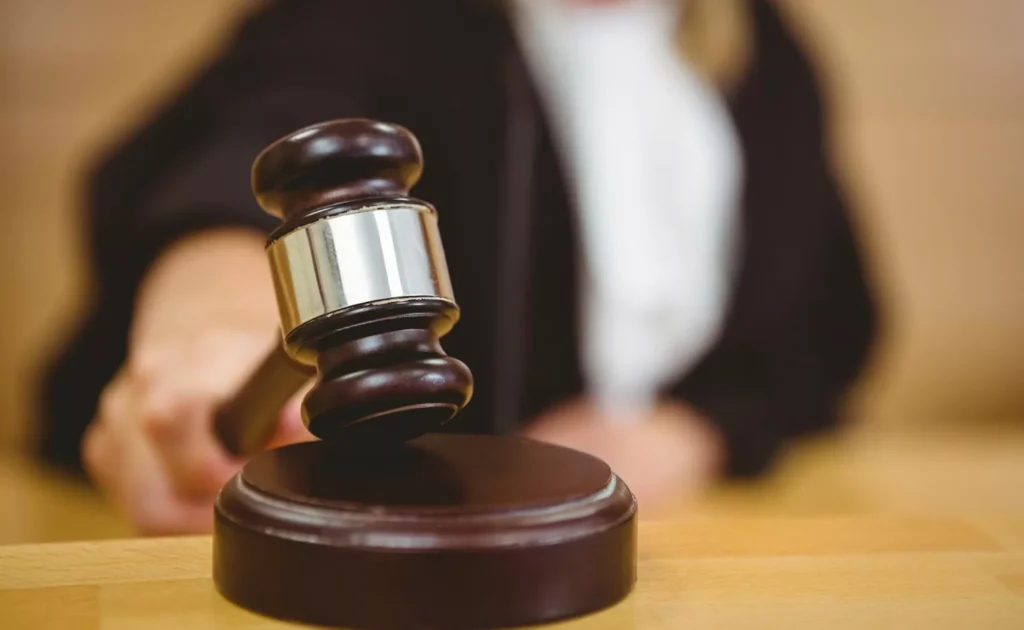What is a Court-Ordered Drug Test Procedure?
Table of Contents
- What is a Court-Ordered Drug Test Procedure?
- Situations That Call for Court-Ordered Drug Testing
- Court Ordered Drug and Alcohol Testing Methods
- Failing a Drug or Alcohol Test: The Next Steps
- Court-Ordered Rehab
- The Benefits of Private Addiction Treatment
- Find Addiction Recovery Support Here!
- FAQs On Court Ordered Drug Test Procedures
- Medically Reviewed By
When it comes to drug tests, court systems will often incorporate both post and pre-trial services for testing as a legal requirement when handling certain cases in order to ensure that clients are drug and alcohol-free.
A court ordered drug test is a type of drug test administered by a court of law. It is usually ordered as a form of probation or as a condition of parole or pretrial release. The purpose of these drug or alcohol tests is to determine whether an individual has recently used a substance or has been using substances while on probation or parole.
This form of testing for drug and alcohol use is designed to not only ensure the individual’s safety, but that of their community as well. Read on to learn more about court-ordered drug testing, and how you can find help to overcome your drug or alcohol abuse today!
Situations That Call for Court-Ordered Drug Testing
There are several situations and legal battles that call for court-ordered drug testing, including criminal cases, family law matters and child custody cases, and probation or parole. In criminal cases, it is not uncommon for a judge to order a drug test. This is often done when the criminal activity in question involves drugs or alcohol, such as DUI and DWI arrests or drug possession charges.
It can also be done to determine whether an individual has been using drugs before or during the commission of a crime. In these situations, the judge may order a court order for the individual to undergo testing to ascertain whether they were taking drugs at the time of the offense.
Child Custody Hearings and Drug Testing
Family law matters also commonly involve court-ordered drug testing. This is particularly true when one or both parties are involved in making child custody arrangements or establishing visitation rights. In these cases, the court may order the parties to submit to child custody drug testing to ensure they are not using any substances that could put their children at risk.
Similar to the testing required for a child custody case, courts may also order drug testing in situations involving adoption, guardianship, or other family law matters. This may include scheduling or random drug testing to ensure the well-being of the adopted child and that possible applications remain drug-free.
Another common situation that calls for court-ordered standard drug testing is when an individual is placed on probation or parole. With probation drug testing, the court or judge may order the individual to submit to legally required drug testing at regular intervals during their probation or parole period. Their probation officers will typically be the ones doing the testing.
This is done to ensure the individual is not using any drugs or alcohol that could interfere with their rehabilitation or put them at risk of violating the terms of their probation or parole. Drug and alcohol testing frequency can vary depending on the individual’s parole or probation circumstances and may include scheduled or random testing.
Court Ordered Drug and Alcohol Testing Methods
Court-ordered drug tests are conducted using urine, a hair follicle, oral fluid, or blood samples. Urine tests are the most common type of court-ordered test to detect drug or alcohol use. Urine tests detect the presence of drugs in the body for up to three days after use, with similar timelines for EtG alcohol testing.
Hair tests are more accurate and can detect drugs for up to three months after use. Oral fluid tests detect drugs for up to 24 hours after use, while blood tests detect drugs for up to 48 hours after use. It is worth noting, that being caught substituting urine samples (or any other type of sample) will be interpreted as a positive test result in nearly all cases.
When conducting a court-ordered drug test, the individual being tested is asked to provide a sample of their urine, hair, oral fluid, or blood. Samples are then sent to drug test centers and tested in a laboratory to determine the presence of drugs. If the test results indicate the presence of drugs, the court may order the individual to enter a drug treatment program.
Failing a Drug or Alcohol Test: The Next Steps
Failing a drug test is one of the most frustrating experiences a person can have. It can lead to job loss or other consequences, depending on the situation. However, it’s important to remember that there are still options available for those who fail a drug test.
Here are some tips for what to do after failing a drug test.
- Seek Professional Help: If you are struggling with a substance abuse problem, it is important to seek help from a professional. A substance abuse counselor can help you develop strategies to manage your substance use and provide support to help you stay on the right track.
- Talk to Your Employer: If you failed a drug test for a job, it is important to be honest and open with your employer. Explain the situation and ask for a second chance. Your employer may be willing to give you another chance if they feel you are willing to make changes.
- Change Your Lifestyle: It is important to make changes to your lifestyle to help you stay away from substances. This could include reducing stress and avoiding environments where substances are used. It can also help to find new interests or activities to fill the time spent using substances.
- Take Steps to Improve Your Health: Drug use can have an impact on your health. It is important to take steps to improve your health, such as eating a healthy diet, exercising regularly, and getting enough sleep.
- Seek Treatment: If you are struggling with a substance abuse problem, it is important to seek treatment. Professional treatment centers can provide professional help and support to help you recover from substance abuse.
Failing a drug test can be a difficult experience, but it doesn’t mean the end of the world. It is possible to make changes and get back on track. The best defense for a positive drug test in many cases is an admission of use, and the willingness to get help and change course. With the right treatment and support, recovery is possible.
Court-Ordered Rehab
Court-ordered rehab is a legal intervention that requires individuals to participate in addiction treatment in lieu of incarceration. It is a potentially life-saving option for people struggling with substance use disorders, as addiction is a chronic and relapsing disease. Going to rehab prior to a court date can also be helpful from the treatment as well as legal consequences perspective.
The courts may order someone to enter rehab as a way to avoid jail time or as part of a sentencing agreement. This can be a great opportunity for individuals to get the help they need for their addiction and avoid the consequences of a criminal conviction.
Court-ordered rehab usually involves a supervised treatment program that includes counseling, group therapy, and any necessary medical interventions. It may also involve attending 12-step meetings, such as Alcoholics Anonymous or Narcotics Anonymous, and other forms of aftercare.
How Long Does Court Ordered Rehab Last?
The length of court-ordered rehab varies depending on the severity of the addiction and the individual’s progress in treatment. In most cases, it will last anywhere from a month to one year.
Court-ordered rehab can be an effective way to help people with addiction get the help they need to recover. It can be difficult to stay in recovery without support, and court-ordered rehab provides the structure and guidance needed to successfully complete treatment and maintain sobriety.
It is important to note that court-ordered rehab is not a substitute for voluntary treatment. Individuals need to take responsibility for their own recovery and commit to making lifestyle changes that will help them stay sober.
Court-ordered rehab can be a difficult process, but it is an important step for individuals who are struggling with addiction and need help. It can be a way to avoid the legal consequences of addiction and to get the support needed to achieve long-term recovery.
The Benefits of Private Addiction Treatment
While there are many options for rehabilitation, private addiction treatment offers the most comprehensive and individualized approach to helping individuals recover from substance use disorders.
Private addiction treatment provides a more personalized approach to recovery. As opposed to a traditional rehab facility, private treatment centers are typically smaller and more intimate, allowing for more individualized attention from counselors and staff.
This allows for more specialized care and can be beneficial for those who need more specific treatment plans and therapies. Private rehab facilities also offer a variety of specialized services that are not available in other rehab programs.
Additionally, many private addiction treatment centers offer aftercare plans to help individuals remain on the path to recovery after leaving the facility. Private treatment also offers more flexible scheduling options, which may be ideal for individuals with other commitments.
Finally, such rehab centers provide a more comfortable and supportive environment. Private treatment may offer more amenities than a traditional rehab center, including private rooms and more comfortable living accommodations. This can be beneficial for those who may feel overwhelmed or uncomfortable in a traditional rehab setting.
Overall, private addiction treatment provides individuals with an individualized, comprehensive approach to recovery. With personalized care, access to specialized services, flexible scheduling options, and a comfortable and supportive environment, you can achieve sobriety safely and successfully.
Find Addiction Recovery Support Here!
If you or a loved one has recently had to undergo drug testing and came back positive, you may be wondering what your next step should be. The Find Addiction Rehabs team is here to help. We work with an extensive network of addiction treatment programs that can help you get your life back on track.
Our hotline is available 24/7 to connect you with recovery resources and programs nationwide. Call now, and we will help you take the first step on your road to sobriety today.
FAQs On Court Ordered Drug Test Procedures
Is it Possible to Get a False Positive on a Drug Test?
Yes, it is possible to get a false positive on a drug test. False drug test results can happen for several reasons, including improper testing procedures, cross-reactivity of certain substances, and the use of certain prescription drugs and medications.
It is important to note that false positive results are rare, and drug tests are generally reliable. If you receive a positive result on a drug test, it is important to talk to the test administrator or other drug testing specialists to make sure the result is accurate. If the result is a false positive, the test administrator should investigate further to determine the cause.
Is Court-Ordered Rehab Effective?
The answer to this question is complicated and depends on a variety of factors. It is important to note that court-ordered rehab is usually paired with other forms of treatment, such as therapy and medication.
This combination of treatments is more effective than any single approach. Additionally, court-ordered rehab provides an individual with the additional structure and support that can help them stay on track. In some cases, court-ordered rehab can be ineffective.
This is often the case when an individual is not truly committed to the process and is not willing to put in the work to make lasting change. Without the individual’s commitment, court-ordered rehab can be a waste of time and resources.
For the most part, it is generally better to seek professional rehabilitation services to ensure that you can safely and successfully recover from your drug or alcohol use.
Deborah Tayloe is a freelance writer specializing in health and sciences. Deborah earned a B.S.Ed. in Secondary Education/English, accompanied by a Spanish minor. Her writing expertise allows her to craft engaging, impactful articles to help people be well.
In addition, she holds a fully accredited Certificate of Natural Medicine and is a certified Herbalist. Through her understanding of complementary medicine, Deborah helps medical professionals give people the information they need to embrace natural approaches to wellness.
When she’s not working, Deborah trains for 5K races and advocates for animal rights.






